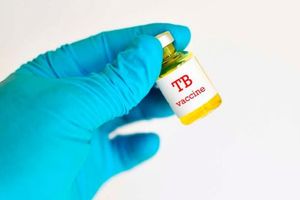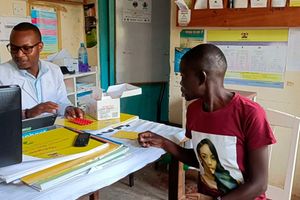It’s a miracle I am alive, gospel musician Peter Machui says of battle with TB

The bacteria responsible for TB can develop resistance to the antimicrobial drugs used in its treatment
Peter Machui, a businessman and gospel artist, was diagnosed with MDR-TB in 2017 and 2019.
Peter Machui is lucky to be alive. At the start of this interview, he is quick to point out that his very existence is encapsulated in a seven-letter word: miracle. He contracted tuberculosis (TB) and reached the point where he had multidrug-resistant TB (MDR TB), caused by an organism that is resistant to isoniazid and rifampicin, the two most effective first-line TB drugs.
By 2017, Machui was thriving. In particular, his entrepreneurial spirit and business acumen had led to a thriving mitumba business. He bought second-hand clothes in Gikomba and resold them in Tanzania.
"One day, I started coughing and the cough was accompanied by chest and rib pains. I returned to Nairobi where I was diagnosed with tuberculosis (TB).
At first, I was in doubt. I was tested again and the diagnosis was confirmed. I was put on the standard six-month TB medication. By this time I was physically weak. By the third week, I felt better and stopped taking the medication," he says.
He was still in denial, which he attributes partly to the stigma associated with the disease.
"Some people associate the condition with other diseases like HIV/Aids or sexually transmitted infections. Others insinuated that I was cursed," he reflects.
After stopping the medication, the symptoms returned after a few months. This time, Machui says, with full force.
"I remember sweating profusely on my bed. I would wake up every morning to sheets soaked with sweat. I lost weight every day. I remember that I weighed 65 kilos before I got sick, but when the second TB, MDR, recurred, I dropped to 45 kilos.
Evaline Kibuchi, chief national coordinator of Stop TB Partnership-Kenya, explains that the bacteria responsible for TB can develop resistance to the antimicrobial drugs used in its treatment.
"When it results in MDR-TB, it requires prolonged treatment and is expensive to treat. Furthermore, the mortality rate is higher compared to regular TB. We also have extensively drug-resistant tuberculosis (XDR-TB), which occurs when a person develops MDR-TB that is resistant to additional drugs," she offers.
Treatment for MDR-TB, says Machui, involved daily medication, injections and strict adherence to the schedule. The side effects were severe, with mental fog and prolonged darkness after each injection.
"When the doctors tested me and found out that I had this form of TB, it became another way for stigmatisation. They were very reluctant to come near me. I realised that the stigma around TB is very deep-rooted," he says.
Nevertheless, he continued to take his daily tablets and follow the instructions. Over time, he got better.
"After six months of daily injections, I was supposed to continue with oral medication for another three months. I was already feeling better, so I thought, 'I'm fine now, I don't need to take these drugs. I stopped," he says.
Then a relapse in 2019. "In September, I remember being at the market, doing my business. I started coughing again and something seemed to come out of my chest. When I touched it, it was like cholesterol, with a foul smell, but I assumed it.
Two months later, my chest problems reappeared, with symptoms like MDR TB, but this time even more severe. I remember that time; I couldn't even talk, walk or climb stairs. I faced many challenges; even my work as a musician became impossible," he says, adding, "I kept thinking about going back to taking the drugs and getting injections every day, and I thought, 'No, I can't go through that again. I started to reject it and the stigma became even more pronounced. I remember struggling for almost six months, lying to my parents that I had completed the treatment when I hadn't. I told the same lie to the doctors and insisted on not being tested again. By that time I weighed about 30 kilos," he says.
Fearing he was dying, he decided to come clean and resumed his medication. Although the treatment would now last 18 months, it didn't involve injections.
The injectable-free drug to treat TB was first used in Kenya in 2018, before being fully introduced two years later.
Data from the World Health Organization (WHO) shows that deaths from drug-resistant TB account for about a third of all antimicrobial resistance deaths worldwide. In 2022, TB was the second leading cause of death from a single infectious agent worldwide, after coronavirus disease (Covid-19). Kenya is one of the countries listed by WHO as having a high burden of TB, appearing on the list for regular TB, TB/HIV infection and multidrug-resistant TB.
The 2023 Global Tuberculosis Report shows that the number of newly diagnosed cases last year was the highest since WHO began global TB monitoring in 1995.
The 2022 figure, the report says, includes a significant backlog of people who developed TB in previous years but whose diagnosis and treatment were delayed by the Covid-19-related disruptions that affected access to and provision of health services.
In the African Region, a WHO report released in September shows that the global burden of drug-resistant TB is increasing, including the number of deaths.
In 2021, there were an estimated 450 000 new cases of rifampicin-resistant TB (RR-TB) and 77 000 new cases of multidrug-resistant TB (MDR-TB) worldwide.
"The burden manifests itself in many ways. From patients who discontinue drug use, to lack of awareness and technologies that are key to diagnosis. Limited supply is also a big concern," says Evaline.





